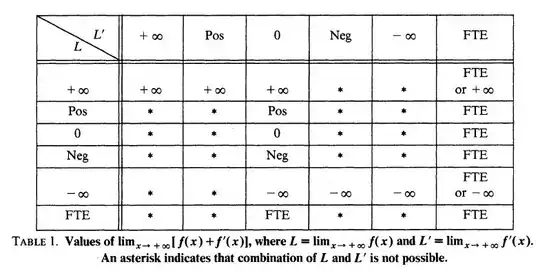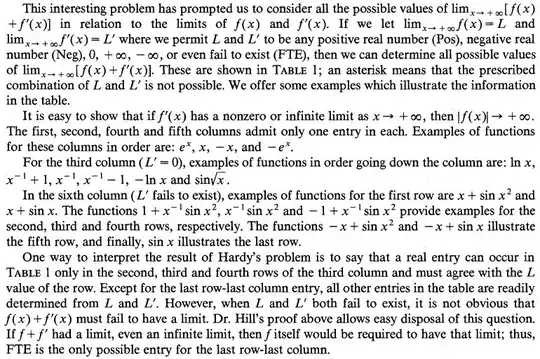André already gave you a very simple example, where $\lim\limits_{x \to \infty } F(x) = 0$ but $\underset{x \to \infty }{\lim \sup}\; F'(x) = 2$ and $\underset{x \to \infty }{\lim \inf}\; F'(x) = -2$ (since $F'(x) = 2\cos (x^2 ) - \frac{{\sin (x^2 )}}{{x^2 }}$). Modifying $F$ to $F(x) = \frac{{\sin (x^3 )}}{x}$, we moreover get an example with $\underset{x \to \infty }{\lim \sup}\; F'(x) = \infty$ and $\underset{x \to \infty }{\lim \inf}\; F'(x) = -\infty$ (since $F'(x)=3x\cos (x^3 ) - \frac{{\sin (x^3 )}}{{x^2 }}$). Obviously, in both examples, $F$ is not a monotone function.
Let's now give an example of a (continuously differentiable) monotone increasing function $F$ with $\lim\limits_{x \to \infty } F(x) = 1$, for which, nevertheless, $\underset{x \to \infty }{\lim \sup}\; F'(x) = \infty$ (so, in particular, $F'(x)$ does not tend to $0$ as $x \to \infty$). We first define a continuous function $f:[0,\infty) \to [0,\infty)$ as follows: for each positive integer $n$, $f(n)=0$, $f$ is linearly increasing on the interval $\left[n,n+\frac1{2^{n+1}}\right]$, $f\left(n+\frac1{2^{n+1}}\right) = n$, $f$ is linearly decreasing on the interval $\left[n+\frac1{2^{n+1}},n+\frac1{2^n}\right]$, and $f\left(n+\frac1{2^n}\right)=0$; for any other $x$, we define $f(x)=0$. Then we have
$$
\int_0^\infty {f(x)\,\mathrm dx} = \sum_{n = 1}^\infty {\int_n^{n + 2^{ - n} } {f(x)\,\mathrm dx} } = \sum_{n = 1}^\infty {\frac{n2^{-n}}{2}} = \frac12\sum_{n = 1}^\infty \frac{n}{2^n} = 1.
$$
Now we define the function $F$ by $F(x) = \int_0^x {f(t)\,\mathrm dt}$. Then,
$$
\lim _{x \to \infty } F(x) = \lim _{x \to \infty } \int_0^x {f(t)\,\mathrm dt} = \int_0^\infty {f(t)\,\mathrm dt} = 1.
$$
On the other hand, by the Fundamental Theorem of Calculus, $F'(x) = f(x)$. Since, for any positive integer $n$, $f\left(n+\frac1{2^{n+1}}\right) = n$, we have
$$
\underset{x \to \infty }{\lim \sup}\; F'(x) = \underset{x \to \infty }{\lim \sup}\; f(x) = \infty .
$$

